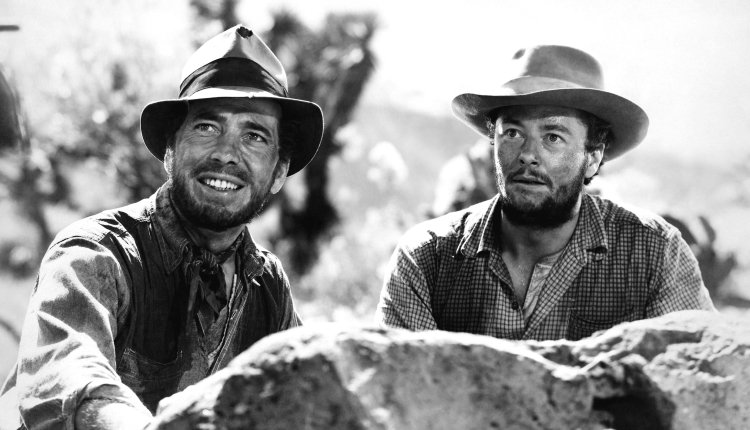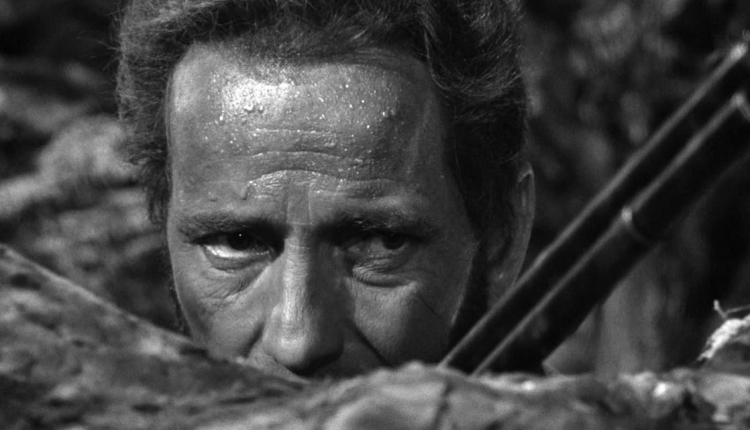When is Enough, Enough? | Greed and The Treasure of the Sierra Madre 70 Years On
“Ah, as long as there’s no find, the noble brotherhood will last
but when the piles of gold begin to grow… that’s when the trouble starts.”
I first saw John Huston’s The Treasure of the Sierra Madre when I was very young, pre-teens… and I hated it. And as a kid who watched everything, saying I hated it was major. I revisited the film by accident about 20 years later and found it a far more rewarding experience than I did as a 10-year-old boy. Back then, my appetite whet by the RTE Guide’s promise of action and adventure, I just couldn’t grasp how complex and yet how simple a film The Treasure of the Sierra Madre is, how intricately and intimately Huston addressed the issues of greed and how it can corrupt the soul. A morality tale that really strikes a chord and now, 70 years on from its release, those very issues are as relevant today as they were then, and in truth probably always will be.
Set in 1925, The Treasure of the Sierra Madre concerns Fred C. Dobbs (one of Humphrey Bogart’s greatest roles), a down on his luck American, pan-handling and poor mouthing his way around Tampico, Mexico. Meeting up with Bob Curtin, a fellow American also hard on his luck, they take random jobs to make ends meet, one of which ends with them being left high and dry by their employer and ending up in a .50 cent a night flop house, lamenting their rotten luck. Here they meet old timer Howard, a veteran goldminer, whose wild stories turn their heads and soon the three decide to band together and attack the Sierra Madre, a tough mountain range, in pursuit of gold. Of course, all does not go according to plan and when they do strike it rich, the effects of the “filthy lucre” become tragically evident. This is where Bogart really shines – Dobbs becomes acutely paranoid; once their returns rise into the tens of thousands of US dollars he becomes blinded by avarice and convinced his partners are out to do him in. It is this paranoia that drives the film, pushing the filthy faced Dobbs to risk life and limb to protect his gold. This inevitably leads him to the attempted murder of his partners, not to protect his share but to eventually take theirs all for himself. He is not content with his lot, he needs more, he needs it all.
This is the real message in The Treasure of the Sierra Madre, contentment. When is enough, enough? In playing Dobbs, Bogart found his most complex character, a character that changes throughout the film. In the opening scenes Dobbs is a man begging for money to feed himself, but also one who still has a modicum of self-respect. This is seen when a stranger (a great cameo from director John Huston) gives him a peso for the second time in the day and Dobbs spends the money on a shave and a haircut. He wants to be human, he wants the sense of pride that comes with being able to step out into society. Yet he also wants to keep his “get rich quick” options open, using his last few coins to buy a share of a lottery ticket that eventually turns up trumps for him and finances the gold mining expedition. Dobbs doesn’t want or feel comfortable looking for charity, he has no problem working for his fair share all the while hoping that lady luck smiles upon him. How many of us work our day jobs dreaming of the lottery? It’s not an uncommon outlook. Though his eventual metamorphosis into a crazed paranoiac is acutely constructed as the film builds, his initial nature of “honest day’s pay for an honest day’s work” is seen in his first conversation with Howard; Dobbs tells Howard that if he went digging for $5,000 worth of gold then he’d be content to leave after reaching his target. Howard, an old pro at this game, casts doubt,
“Yeah…But I tell you, if you was to make a real strike, you couldn’t be dragged away. Not even the threat of miserable death would keep you from trying to add 10,000 more. Ten, you’d want to get twenty-five; twenty-five you’d want to get fifty; fifty, a hundred. Like roulette. One more turn, you know. Always one more.”
This again reflects on the idea of contentment. Always one more. It is this ache that drives Dobbs and he makes a liar out of himself as the film progresses. The opening sequence in the film shows him begging from the same person three times. Dobbs doesn’t look at those he tries to hit up for a few pesos, he’s too ashamed to look them in the eye. He lives with this shame and it’s this gnawing feeling of indebtedness that drives him to need and yearn for more, to keep him off the streets. After the trek into the Sierra Madre nearly kills them, Dobbs is intent on staying until they get something, Dobbs himself saying, “I think I’ll go to sleep and dream about piles of gold getting bigger and bigger and bigger.” It is this need that poisons Dobbs, his contentment is overtaken by greed and when they strike it rich the prospect of wealth corrupts his soul. He hasn’t known much but humiliation or experienced any good fortune so when his luck does turn he drinks it all up, gorging himself.

Of course, Dobbs’ decline can only be measured against how his fellow miners react and Roger Ebert quite rightly stated that The Treasure of the Sierra Madre is as much a study of character as it is an essay on greed. Look at how Dobbs becomes so twisted and warped as the film moves on, but Curtin and Howard’s character’s do not. Are they stronger, or more focused? Is Dobbs weaker and shallow? The answer is yes and no to both questions as the three men display all the strength, frailty and questioning doubt that makes up the human psyche. Between the three of them they beautifully illustrate the different facets of humanity; where Dobbs is prepared to kill for gold, Howard is willing to try save the life of a small Mexican boy who nearly drowns. Where Curtin risks his life to rescue Dobbs from a cave in, Dobbs later attempts to kill Curtin for his share of the gold. Where Dobbs meets his grisly end through his insatiable lust for gold and riches, Howard is elevated to a place of high esteem within the community the young Mexican boy belonged to. He is rewarded for his caring, Dobbs is punished for his greed. This is one of the beautiful messages that weaves its way through The Treasure of the Sierra Madre, be kind. Kindness will always be rewarded. Dobbs calls this out, saying,
“Conscience. What a thing. If you believe you got a conscience it’ll pester you to death. But if you don’t believe you got one, what could it do t’ya? Makes me sick, all this talking and fussing about nonsense.”
This belief that conscience is a pest is crucial to how the three central characters of Dobbs, Curtin and Howard represent various aspects of the human psyche. This is seen in the arrival of Cody, the prospector who follows Curtin from the town when he is returning with their supplies. Dobbs wants to kill him to protect their find. Howard wants to let him live and include him in their group. Curtin is unsure, seeing how both killing him and including him will benefit their find. Eventually the other two are swayed by Dobbs and they collectively decide on killing Cody. While Curtin sits on the fence and eventually sides with Dobbs, when Cody is killed (but by the Mexican bandits and not by them) Curtin asks if the three of them will give up a quarter of their share of the gold to give to Cody’s wife when they get back to America. This is his method of soothing his guilty conscience, even though he didn’t kill Cody but was prepared to let him be killed. Howard agrees but Dobbs, unsurprisingly, does not.

It shouldn’t go without notice that Madre is Spanish for Mother and it’s Howard who looks upon the mountain as a generous, giving soul, a mother to them. He talks about her with profound respect and even at the end, when they decide to break camp Howard insists that they spend a week returning the mountain to how she looked before they began to dig. Dobbs humours Howard’s wishes to, in some way, make amends for what they have done,
“We’ve wounded this mountain. It’s our duty to close her wounds. It’s the least we can do to show our gratitude for all the wealth she’s given us. If you guys don’t want to help me, I’ll do it alone.”
This is another one of the many messages that pepper the film, do no harm. Howard wishes to heal the mountain, he wishes to help the young boy, Curtin wishes to recompense Cody’s widow and is even unwilling to tie up Dobbs even when he knows that Dobbs wishes to kill him.
Of course, that ending is one of the best endings in film history, such a fitting conclusion, and something that I will not talk about here. If you haven’t seen The Treasure of the Sierra Madre, then I encourage you to seek it out and sit down to enjoy one of the greatest examinations of morality ever committed to film. As I said before, the film may be 70 years old but its themes are timeless.

